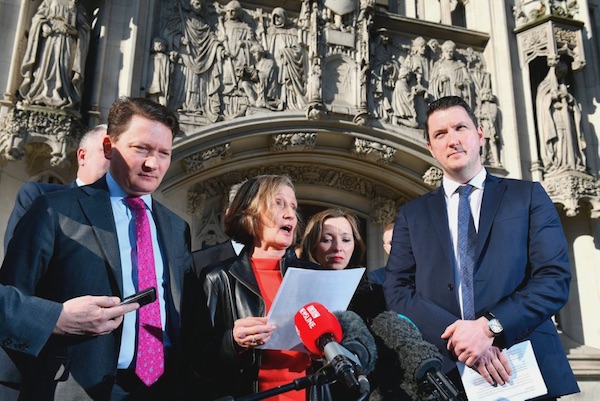
The Supreme Court in London has unanimously backed the appeal by the family of Pat Finucane against the refusal of the British government to carry out a proper inquiry into his 1989 murder by state agents.
The family has won a binding declaration that a previous review had not been an effective investigation into his death. However, the court said it would not order the British government to hold a public inquiry, leaving the campaign facing the possibility of further delay.
The ruling has entirely vindicated the long justice campaign by the Finucane family and their rejection of the 2012 de Silva review. However, the judgement was wilfully misinterpreted and spun in the mainstream media as a setback for the family.
Giving a statement outside the Supreme Court, Mr Finucane’s widow, Geraldine, said: “This is a historic moment. I stand before you today outside the United Kingdom Supreme Court with one simple message: we won.”
She added: “The British government now knows that it cannot conceal the truth any longer. They have now been told this by the highest court in the land.
“It is time for the murder of Pat Finucane to be properly and publicly investigated in a public inquiry. Nothing less will suffice.”
Mr Finucane was killed in February 1989 by loyalists in an attack which Britain admitted seven years ago involved collusion by the state. The 39-year-old was shot 14 times while enjoying Sunday lunch at home with his family.
The cynical and brutal assassination came to symbolise Britain’s ‘dirty war’ against the nationalist population of the Six Counties. Successive London governments have repeatedly reneged on promises, including an international agreement signed in 2001, to hold a public inquiry into the killing.
in 2011, former British Prime Minister David Cameron offered up the de Silva review. Based chiefly on an examination of intelligence documents, the former UN prosecutor Desmond de Silva found “shocking” levels of state collusion involving the British Army, police and MI5 -- but ruled out an “overarching state conspiracy”; and found no serving officers to be culpable.
In a withering response, the Finucane family condemned the review as a “sham”, a “whitewash” and “a confidence trick dressed up as independent scrutiny and given invisible clothes of reliability”.
The Supreme Court in London has now backed that view, finding that there had been a violation of the family’s human right to a proper investigation. The court also found that while Mrs Finucane had indeed been given “an unequivocal undertaking to hold a public inquiry into Mr Finucane’s death”, the British government’s efforts to avoid one had been a “political judgment”.
The court noted that the European Convention on Human Rights had yet to be respected. Justice Kerr said: “It is for the state to decide... what form of investigation, if indeed any is now feasible, is required in order to meet that requirement.”
The British government must now comply with the ECHR requirements for an effective investigation. Peter Madden, a Belfast lawyer and former partner of Patrick Finucane, said “it’s back to the British government to decide what they are going to do”.
Speaking on radio, Mr Finucane’s son John said the judgment was a “great result” for the family. which had blown the de Silva review “out of the water”.
“It was very emotional for all of us. It is an enormous relief for my mother, it has given all of us a boost.”
The British government has “run out of road” he said, and will “finally have to do the right thing”.
Speaking in the Dail, the Taoiseach Leo Varadkar described the ruling as “very significant”, and said that his government’s position remains that a public inquiry should be held.
“The position of the Irish Government is that the British government should now honour its commitment to carry out a public inquiry in accordance with the Inquiries Act, into the murder of Pat Finucane, the solicitor and human rights activist,” Mr Varadkar said.
Sinn Fein leader Mary Lou McDonald said she “warmly welcomed” the Taoiseach’s commitment to vigorously pursue the matter. “I hope the British government on this occasion moves away from it’s position of denial of the truth to the Finucane family,” she said.
Aontú leader Peadar Toibin said it was “beyond time” for the murder to be comprehensively and independently investigated. He criticised the efforts of the Dublin government to secure a public inquiry as “minimal”.
British Prime minister Theresa May’s official spokesman said only the British government would consider the court’s judgment before determining what kind of investigation “if any” to order into the murder of Pat Finucane.
“We recognise the suffering of Mrs Finucane caused by the appalling murder of her husband. In 2012 the then prime minister apologised for the collusion that took place, which should never have happened. In relation to the supreme court we are considering that judgment,” the spokesman said.
![[Irish Republican News]](https://republican-news.org/graphics/title_gifs/rn.gif)
![[Irish Republican News]](https://republican-news.org/graphics/title_gifs/harp.gif)

